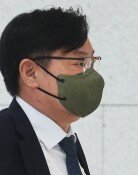The problem is not Japan`s collective self-defense
The problem is not Japan`s collective self-defense
Posted June. 16, 2014 05:08,
People were packed in the public hall of Shibuya district office in Tokyo on the June 10 evening. There was no empty seat even on the second floor. Around 2,200 citizens came to the lecture marking the 10th anniversary of the Article 9 Society, a gathering that is to protect Article 9 of Japans Constitution. The topic of the event was the collective self-defense and Article 9 of the Constitution. It was an occasion to block the exercise of the collective self-defense that the Abe administration is pushing as it violates Article 9 of the Constitution, which forces Japan to give up war and bans the countrys military from holding weapons.
It had many audiences in the 20s and 30s, which was exceptional. It was quite hard to meet young people although this reporter attended gatherings where people urge to address the comfort women issue or oppose visiting the Yasukuni Shrine where war criminals are buried.
Generally, more people are against the collective self-defense than those are in favor of it in many opinion polls conducted by Japanese media. The collective self-defense is a right that allows Japan to fight back in case other country is attacked, taking it as if Japan is under attack. As Japanese self-defense soldiers have to shed blood abroad, the Japanese people are against it.
Why is Japanese Prime Minister Shinzo Abe pushing this ahead? I had a good opportunity to know the answer. I had an interview with Shinichi Kitaoka, president of Kokusai University, who laid a theoretical foundation for the use of collective self-defense in March this year. He was an acting senior person in the discussion for the reconstruction of legal grounds for security protection, an advisory body reporting directly to the minister.
When I asked why Japan sticks to collective self-defense by changing the interpretation of the Constitution, he said, Its interference of our affairs. He meant that it was none of a Korean reporters business whether Japan allows the collective self-defense or not. Then, he said, Although there is risk, a country that lives in affluence (Japan) should help countries in trouble bring peace. The peoples opposition is not right.
He stressed that the collective self-defense is Japans domestic political affairs, but it is hard to buy for Korea. It could allow Japan to intervene in issues on the Korean Peninsula. For such reason, the Korean government clearly says on the use of collective self-defense, Without the Korean governments request or agreement, the security issues on the Korean Peninsula can never be tolerated.
The problem is not the collective self-defense, however. It is the direction where Japan has been heading since the beginning of the Abe administration in December 2012. Behind the series of Japans moves -- Prime Minister Abe remarks in April last year that invasion is not defined yet, the increase of the defense budget in 11 years, its new defense policy that further strengthened the self-defense forces in December 2013, and an about-face from the ban on exporting weapons to three principles on the transfer of defense equipments in 47 years in April 2014 is becoming a military power.
The Abe administration is making progress in these matters in the names of an ordinary country and an aggressive pacifism. It claims that the collective self-defense is also needed for Japan to contribute to world peace.
I met many ordinary Japanese citizens while writing the eight articles of the Visiting the Sites of Love and Hatred between Korea and Japan series, which continued, from April 1 through June 13. I could confirm that they who have affection for Korea were putting a brake on the Abe administrations tilting toward the right.
Nevertheless, Korea should be concerned about the direction that is driven by Japanese politicians. It seems that the direction is hard to change as long as Korea continues to face the emergence of China, threats from North Korea, and the request for an increase in defense contributions from the U.S. This is why Korea should stay vigilant and constantly monitor and respond to these risks.
Headline News
- Med professors announce intention to leave hospitals starting Thursday
- Bridge honoring Sgt. Moon Jae-sik unveiled in Pennsylvania
- Chief of Staff Chung tells presidential secretaries to stay away from politics
- US FTC bans noncompete agreements
- N. Korea launches cyberattacks on S. Korea's defense companies







